Carpet cleaning is essential – your carpet will be stained with all sorts of dirt and grime from shoes, spills, and pets. Frequent vacuuming, spot cleaning, and deep cleaning can extend the life of any type of carpet.
Allowing dust and dirt particles to remain on carpet fibers can cause them to look dull and retain odors, which can eventually wear down carpet backing and fibers.
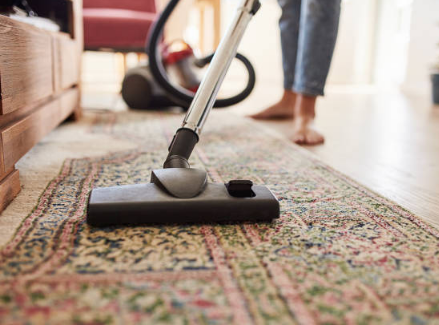
Here’s how to clean your carpet using household items you may have on hand.
How Often to Clean Carpets
Whether you’re carpeting or ruging, vacuuming regularly at least once a week is a must – and more often if you have pets or children. Spills and stains should be disposed of as soon as possible.
Consider hiring a professional carpet cleaning company or doing deep cleaning yourself at least twice a year.
What You’ll Need
Equipment/Tools
- Vacuum
- Spray bottles
- Microfiber cloth
- Bucket
- Oscillating fan
- Scrub brush with rigid nylon bristles
- Old towels or rags
- Garment steamer
- Steam mop
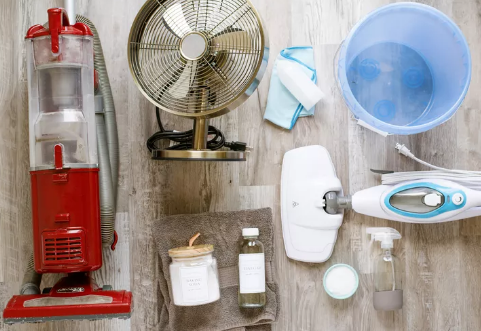
Material
- Distilled white vinegar
- Baking soda
- Table salt
1. Start with a Thorough Vacuum
Always start with a vacuum with strong suction. However, if you don’t have a vacuum cleaner, there are other ways to clean your carpet, such as an old-fashioned broom, carpet rake, or carpet sweeper.
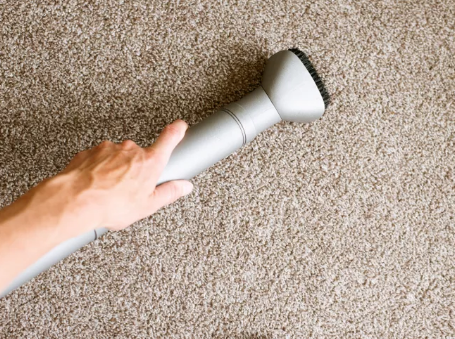
For the most thorough carpet vacuuming, take the time to remove furniture and any other items from the carpet. Set the vacuum cleaner to the right height for your carpet type for maximum suction.
Vacuum slowly and pass over high-traffic areas multiple times for best results. Wipe on the carpet with a rubber-edged rubber broom to collect pet hair.
2. Spot Clean Stains
The best time to deal with carpet stains is as soon as possible. If liquid spills, blot the water immediately with a paper towel or white cloth. Use a carpet stain remover to start treating stains quickly.
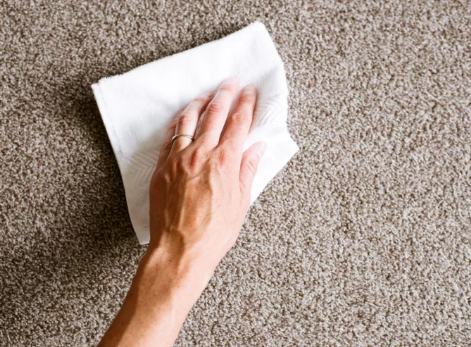
For more solid mud stains or dropped food, use a credit card edge or a blunt knife to remove the solids. After the initial cleanup, follow the recommendations on our decontamination chart to remove specific types of stains.
How to Clean a Carpet with Vinegar
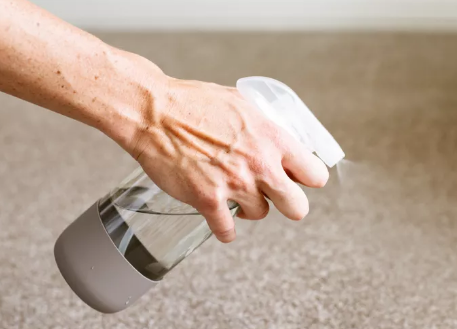
- Mix one part distilled white vinegar with three parts cold water. If cleaning the entire carpet, you will need to refill the bottle several times.
- Wet the carpet. Working in a small area of 3 feet x 3 feet, spray the vinegar solution onto the carpet until it is very damp. Follow the grid so you know where you’ve cleaned. If you’re cleaning a small rug, take extra precautions to protect the floor underneath the rug from moisture damage.
- Allow the solution to soak. Let the solution sit on the carpet for five minutes to begin to decompose the soil.
- Blot the solution. Use a microfiber cloth to wipe off the solution and dirt. Prepare a bucket of clean water to rinse the microfiber cloth. Change the water frequently when it gets dirty.
- Increase the drying speed by injecting some air into the room. Open windows and doors to increase airflow in the room or add a moving head fan. Do not allow vehicles to drive on carpet until it is completely dry. If you must use the room when the carpet is wet, place a plastic sheeting or tarpaulin on the traffic aisle to prevent it from getting dirty.
How to Clean Carpets with Baking Soda and Salt
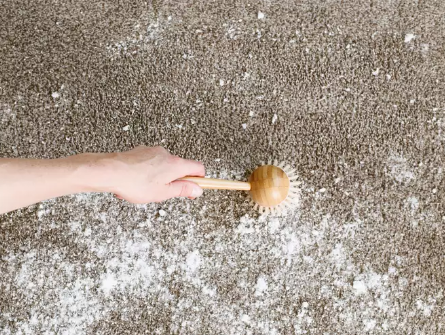
Vacuum the loose dirt from the carpet and remove the visible stains as recommended on the decontamination sheet.
- Mix baking soda and salt one-on-one. The salt can be table salt or coarse salt and fill a spray bottle with cold water.
- Sprinkle the mixture well over the carpet. You may find it easier to work in grid mode, starting from corners and working all the way to the exit.
- Spray the area with a spray bottle filled with clean water. The carpet should be very damp, but not soggy.
- Use a brush to brush the baking soda into the fibers. Move in one direction and then at a 90-degree angle to help lift the soil.
- Wipe off loose dirt with an old towel or rag. Leaving a little baking soda in the fibers will do the trick. Allow the rug to air dry completely. Use a vacuum cleaner to remove the remaining baking soda from the fibers.
How to Steam Clean Carpets
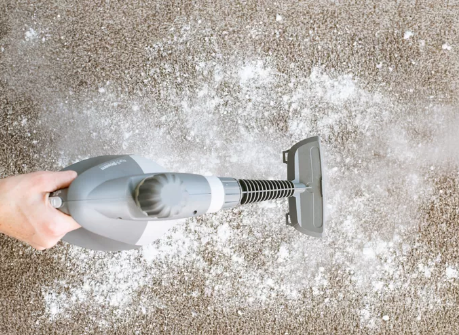
If you have a garment steamer or steam mop that you usually use on hard surface floors, you can use it to clean your carpet after vacuuming and pre-treating the stains.
- Follow the same steps to mix the baking soda and salt. Sprinkle the mixture on the carpet and use steam instead of cold water to wet the mixture.
- Start steaming the carpet. If you use a garment steamer, place the garment steamer head about six to twelve inches away from the carpet. If you’re using a steam mop, use a microfiber mop head or carpet attachment to wipe the baking soda mixture off the carpet.
- Allow the steam to wet the carpet completely. Use a brush to brush the damp mixture into the fibers.
- Use an old towel or microfiber cloth to absorb loose soil. Allow the carpet to dry completely, then vacuum away any residue left on the carpet.
Other Tips to Keep Your Carpet Clean for Longer
- Place doormats inside and outside all entrance doors to block the soil.
- Take off your shoes at the door to prevent dust from leaving marks.
- Vacuum several times a week and dispose of stains immediately.
- Replace or clean HVAC filters to capture dust particles circulating in the air before they land on carpets.
- Keep the vacuum cleaner well maintained and kept clean so that it can function properly.
- If you have pets, groom and bathe them frequently to protect the carpet.
Frequently Asked Questions
How often should carpets be vacuumed?
Vacuum at least once a week, or twice a week if you have children or pets.
When should carpets be deep cleaned?
Plan to deep clean your carpet every six months, whether it’s steam cleaning yourself or hiring a professional carpet cleaner.
What is the average lifespan of a carpet?
Carpets can last anywhere from five to ten years, depending on the use, type, and use. High-traffic areas don’t last as long as frequently used rooms.

